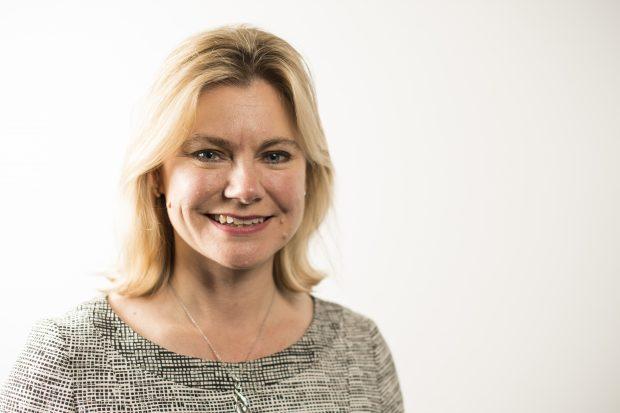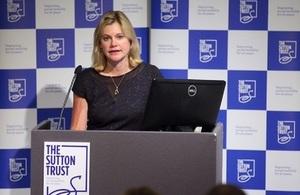Education Secretary unveils schemes to tackle social mobility

New initiatives to tackle social mobility and help pupils from all backgrounds reach their full potential were announced today (12 July) in a keynote speech by the Education Secretary Justine Greening.
 Speaking at the Sutton Trust Social Mobility Summit, to mark its 20th anniversary, the Education Secretary confirmed that leading national and local businesses have signed up to provide careers advice to young people in 12 ‘Opportunity Areas’, which were announced in her speech at PwC in January, with the support of a £2million government-backed fund.
Speaking at the Sutton Trust Social Mobility Summit, to mark its 20th anniversary, the Education Secretary confirmed that leading national and local businesses have signed up to provide careers advice to young people in 12 ‘Opportunity Areas’, which were announced in her speech at PwC in January, with the support of a £2million government-backed fund.
Building on the programme of activity being led in these areas, Justine Greening also named the schools that will act as Education Endowment Foundation (EEF) Research Schools in the Opportunity Areas. These schools will get a share of £3.5million to gather and share evidence of best practice on social mobility to help teachers tackle this issue in their schools.
Sir Kevan Collins has been appointed as the Evidence Champion for the Opportunity Areas to ensure intelligence is shared effectively across the twelve areas. The Chairs of the Partnership Boards – responsible for driving forward activity in each Opportunity Area – have been named for Derby, West Somerset and Scarborough.
Alongside this, Justine Greening reaffirmed her commitment to supporting the teaching profession, enabling teachers to be the best they can help every pupil to achieve their potential.
The announcement comes as new research published by the Sutton Trust shows that tackling social mobility could boost our annual GDP by £39billlion – the equivalent of £590 per person.
Education Secretary Justine Greening said:
This is not just a mission for government, or a mission just for the Sutton Trust. It is a generational mission for all of us.
We don’t have to accept Britain as it has been in the past. Ours is a generation that can build something better. It is a simple idea. It is a powerful idea. It is an urgent idea.
I believe now we absolutely need to fix social mobility, and make sure it happens. And make sure this is a country where there are no barriers to anybody becoming the best that they can be.
Supporting the teaching profession
Teachers are the great drivers of social mobility and can have the biggest impact on unlocking young people’s talents. Earlier this year, the Education Secretary outlined her vision for the teaching profession, announcing a £75million Teaching and Leadership Innovation Fund to invest in high quality professional development for teachers and leaders working in challenging areas. Justine Greening confirmed that £20 million – the first round of this – will go to programmes from September.
The Department is also setting aside £10 million from the Teaching and Leadership Innovation Fund for teachers and leaders in challenging schools to take part in the newly reformed, gold standard National Professional Qualifications to ensure these schools have great leaders.
This approach will help to deliver school improvement and drive social mobility across the country and help to tackle regional inequalities in educational outcomes.
Business support
Research shows that young people who have four or more workplace encounters while at school are 86% less likely to be NEET and on average will go on to earn 18% more than their peers who did not.
The Careers & Enterprise Company (CEC) is collaborating with 40 national and local ‘cornerstone’ employers to prepare pupils for the world of work at more than 260 secondary schools and colleges in the Opportunity Areas.
Employers that have signed up to this £2million initiative include: Adecco; Butlins; KPMG; Michelin; Mantra Media; NatWest; PwC; and Rolls Royce. Together with the CEC, these employers will give tailored careers support to young people in the Opportunity Areas, including:
-
Giving all pupils aged 11 – 18 access to at least four inspiring ‘encounters’ with the world of work; and
-
Giving all secondary schools and colleges in the Opportunity Areas access to a local senior business volunteer (Enterprise Adviser), who will work with headteachers and college principals to unlock local business relationships and advise on their careers programme.
This commitment is backed by leading business representatives, such as the Confederation of British Industry (CBI) and the Federation of Small Businesses (FSB). These organisations will encourage their members to offer more young people opportunities to help prepare them for future careers through activities such as mentoring, work experience, mock interviews and career talks.
Claudia Harris, Chief Executive of the Careers & Enterprise Company, said:
Over 40 of our economy’s leading businesses have stepped forward to ensure we can increase young peoples’ exposure to the world of work following clear evidence that this improves employment outcomes.
The scale of collaboration between businesses announced today will make a much-needed dent in social immobility in key areas and we are proud to be co-ordinating these efforts.
EEF Research Schools
The 11 Research Schools named by the Education Endowment Foundation will act as local centres of excellence, working with schools in the Opportunity Areas to deliver evidence-based approaches to tackling social mobility and provide resources for teachers. This will support local teachers to be the best they can be and tackle the regional inequalities surrounding educational outcomes for local pupils.
The 11 Research Schools have been named as:
- Hastings Research School at Ark Blacklands Primary Academy;
- Stoke-on-Trent Research School by The Keele and North Staffordshire Alliance;
- Norwich Research School at Notre Dame High School;
- Oldham Research School by The Greetland Academy;
- Blackpool Research School at St Mary’s Catholic Academy;
- Doncaster Research School by Partners in Learning;
- Scarborough Research School by Esk Valley Alliance;
- Derby Research School at Wyndham Primary;
- West Somerset Research School at The Blue School, Wells;
- Bradford Research School at Dixons Academies; and
- East Cambridgeshire and Fenlands Research School at Littleport CP School.
EEF Research Schools have already developed programmes to help schools make the most of teaching assistants, training to support literacy in the early years and backing to develop Research School leads.
Justine Greening also announced that Sir Kevan Collins, Chief Executive of the EEF, would become ‘Evidence Champion’ for the Opportunity Areas. He will support the regions to better use evidence to improve outcomes and social mobility prospects for young people, particularly those from disadvantaged homes.
Sir Kevan Collins, Chief Executive of the Education Endowment Foundation, said:
We know that there are big differences in educational standards across the country. Reaching these ‘coldspots’ is one of the biggest challenges we face in our drive to improve social mobility. While evidence of ‘what works’ is one of our most useful tools to do this, we know that research on its own is not enough to make a difference in the classroom.
Research Schools are breaking down these barriers even more, so that research doesn’t stay in the pages of academic journals but has a real impact on classroom practice. Putting teachers in the driving seat can make all the difference.
The Education Secretary also confirmed the Chairs of three of the Partnership Boards that will be responsible for driving forward the activity in each Opportunity Area. They are:
- Derby – Professor Kathryn Mitchell, Vice-Chancellor of Derby University;
- West Somerset – Dr Fiona McMillan OBE in West Somerset; and
- Scarborough – Sir Martin Narey.
All three will bring a wealth of experience and credibility to these roles and help to tackle the challenges unique to each of these areas.











Responses